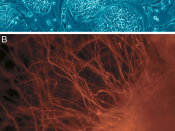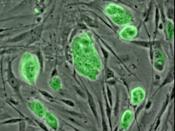Introduction
One of the most significant medical discoveries of the 21st century is the use of embryonic stem cells in research and treatment of conditions that are considered incurable. Embryonic stem cell research raises many questions in morals and ethics in the medical community.
The question, "should human stem cell research be banned?" will be the focus of this discussion. Both the arguments for and against stem cell research will be introduced in this essay in regards to the ethical questions that can arise from the culturing of human embryonic stem cells. There will also be an emphasis on the benefits that can come from this type of research.
What is Human Embryonic Stem Cell Research?
Before getting into the moral and ethical issues of this subject, we must first understand exactly what human embryonic stem cell research is. Human beings, like all animals, have stem cells that hold the ability to constantly renew themselves.
Stem cells found in human adults mature into very specific cells, for example, heart, blood, and brain cells. The exciting discovery found in embryonic stem cells is that they are pluripotent; they have the ability to develop into almost any cell type. These are the cells that are found in a four to five day old embryo.
The idea is that these highly adaptable stem cells could possibly be used to develop new cells that can be used to replace cells that have been damaged from injuries, such as spinal cord injuries, or diseases, such as Alzheimer's or Parkinson's. These stem cells could also be used in research to create new drugs to treat these and other conditions.
Currently, stem cells for this type of research are obtained from aborted fetal tissue, excess embryos from infertility treatments, and in some cases, embryos created specifically for...


